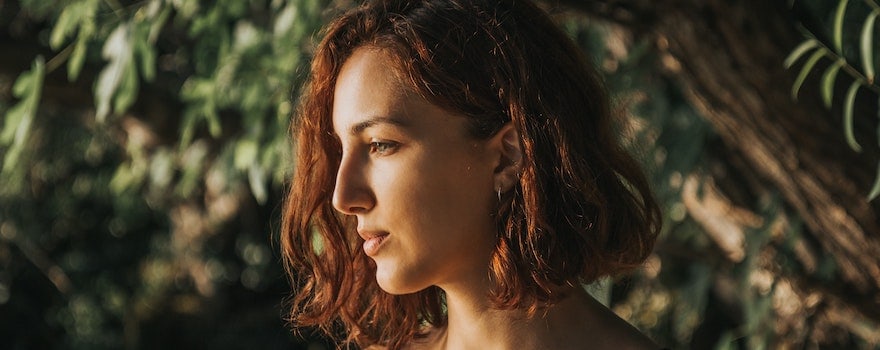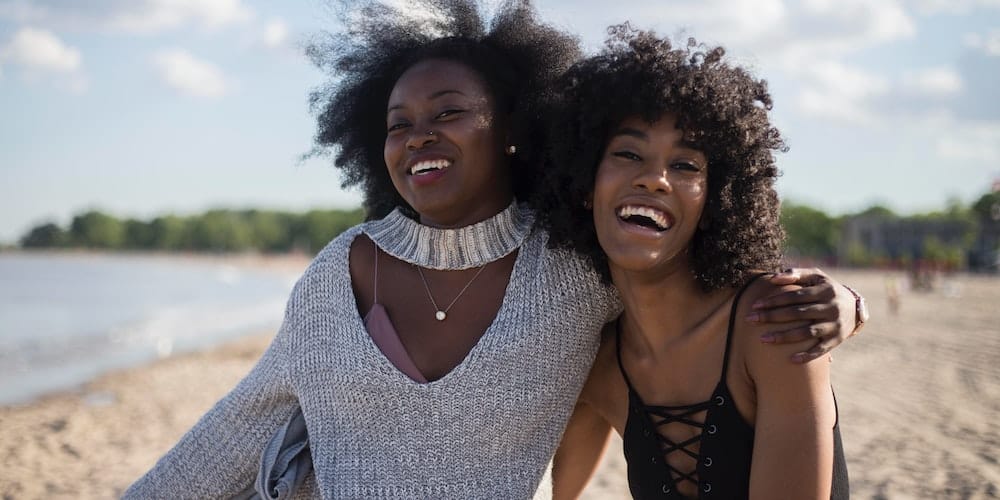Why take hair vitamins?
They promote keratin production
Some vitamins support the natural production of keratin, one of the main components of hair fibers.
This protein provides structure and strength, protects, maintains hydration, and elasticity of the hair.
Unfortunately, its production decreases over the years. This can result in hair loss, dull and dry hair. The hair becomes brittle and loses its elasticity.
Read also | What are the best dietary supplements for hair?
Vitamins B6 and B8 stimulate keratin synthesis. Thus, they help slow down potential hair loss and restore keratin levels.
They enhance hair beauty
Vitamins have beneficial effects on the beauty and appearance of hair. A diet rich in vitamins or taking vitamin supplements can lead to visible results.
Gradually, hair becomes shinier and softer. It also gains suppleness and elasticity, allowing for better-defined curls.
Some B vitamins also regulate sebum production for less oily hair.
The ends are repaired, and there are fewer split ends. Finally, the hair is easier to style and detangle.
They support hair growth
Vitamins are important for hair growth.
On one hand, they support cellular regeneration at the level of hair follicles. Gradually, ‘dead’ hair is replaced by new hair, thus ensuring optimal hair growth.
On the other hand, they activate micro-circulation at the scalp level. This way, hair follicles are better nourished and oxygenated, allowing them to produce more new hair.

What are the most effective vitamins?
Vitamin B3
Vitamin B3 is also known as ‘niacin‘.
By nourishing the scalp and activating blood circulation, it promotes hair growth.
Moreover, it contributes to strong and shiny hair.
Finally, it helps fight dandruff by slowing down cell degeneration and shedding on the scalp.
Where to find it: in chicken, salmon, tuna, rice, peanuts, brewer’s yeast, almonds, or prunes.
Vitamin B5
Vitamin B5 or ‘pantothenic acid’ is involved in cell renewal and hair growth.
While slowing down hair loss, it stimulates regrowth, makes hair stronger, and prevents breakage.
It also adds density to thin hair and prevents the early appearance of gray hair.
Panthenol (or provitamin B5) is the precursor of this vitamin. It’s a cosmetic active often found in fortifying shampoos and hair care products.
Where to find it: in shiitake, organ meats, sunflower seeds, brewer’s yeast, avocado, or egg yolk.
Vitamin B6
Vitamin B6 is involved in keratin synthesis. It is particularly interesting for individuals suffering from alopecia.
Indeed, it stimulates hair growth and promotes regrowth. It thickens and densifies thin or sparse hair.
Moreover, it regulates excess sebum. It’s therefore a valuable ally for oily hair.
In dietary supplements, it can be associated with cysteine. This sulfur amino acid supports its action and stimulates hair growth.
Where to find it: in oily fish, poultry, organ meats, potatoes, pistachios, and chickpeas.
Vitamin B8
Also called ‘biotin’, it slows down hair loss as shown by this study. To do so, it accelerates cell renewal and hair follicles. Additionally, it promotes blood circulation in the scalp.
Vitamin B8 also brings shine, density, and volume to the hair.
Read also | The benefits of biotin for hair
Finally, it strengthens hair fibers and improves keratin structure. That’s why they are often combined in hair supplements.
Where to find it: in brewer’s yeast, almonds, walnuts, organ meats, eggs, mushrooms, and whole grains.

Vitamin B12
Vitamin B12 participates in the regeneration of hair follicles. In addition to supporting hair growth, it contributes to soft and strong hair.
It also slows down graying and the appearance of white hair. To do this, it stimulates the production of melanin, responsible for hair pigmentation and color.
Where to find it: in meats and offal, seafood, oily fish, eggs, dairy products, and the Nori algae.
Vitamin C
Vitamin C or ascorbic acid stimulates hair follicles and blood micro-circulation. Thus, it accelerates hair growth.
Thanks to its antioxidant action, it protects against free radicals and their damage: hair loss, the appearance of white hair…
Moreover, it combats dryness and prevents hair dehydration.
Where to find it: in camu camu, acerola, rosehip, blackcurrant, parsley, citrus fruits, peppers, and cabbages.
Vitamin D
Vitamin D is necessary for hair follicles to produce new hair. This is why a deficiency often leads to hair loss as demonstrated by this study.
Having sufficient vitamin D intake is particularly important in cases of alopecia or baldness.
This vitamin also gives shine back to dull hair.
Where to find it: in cod liver oil, oily fish, eggs, dairy products, and mushrooms.
Vitamin E
Vitamin E or tocopherol has antioxidant properties that help fight free radicals. By slowing down the aging process, it prevents the appearance of white or gray hair.
Moreover, it stimulates blood circulation and oxygenates the scalp, promoting hair growth.
It also has a repairing effect on damaged hair and split ends.
Where to find it: in vegetable oils, oily dried fruits, oily fish, apricots, prunes, and avocados.
Which vitamin according to your needs?
Here’s an overview of the vitamins to prioritize according to your needs and concerns:
Hair Loss
- Vitamin B3
- Vitamin B5
- Vitamin B6
- Vitamin B8 or biotin
- Vitamin C
- Vitamin D
Dandruff
- Vitamin B3
- Vitamin B5
Strength and Vitality
- Vitamin B5
- Vitamin B8 or biotin
- Vitamin C
- Vitamin D
Oily Hair
- Vitamin B3
- Vitamin B6
Dry and Damaged Hair
- Vitamin B3
- Vitamin B8 or biotin
- Vitamin E



